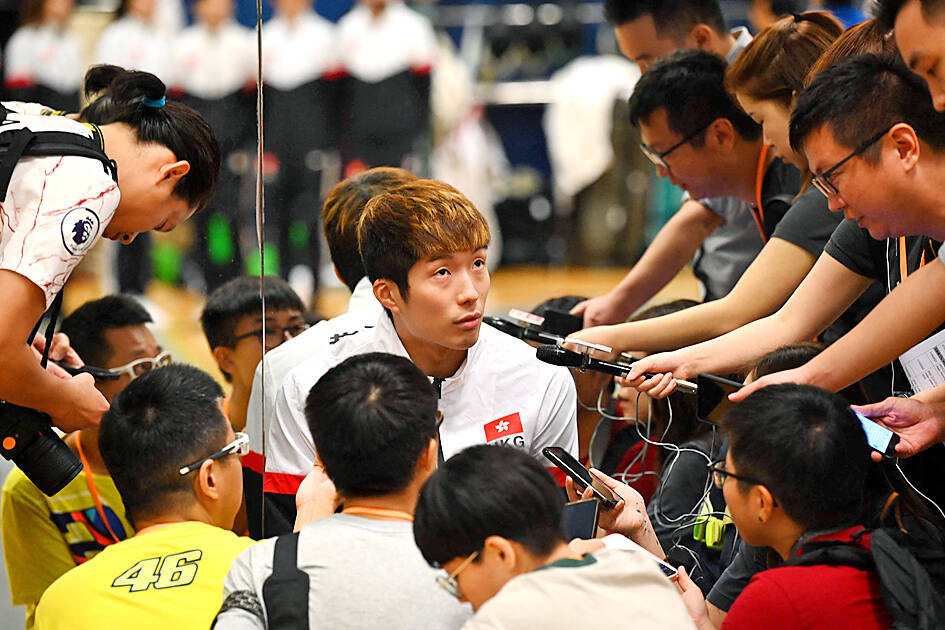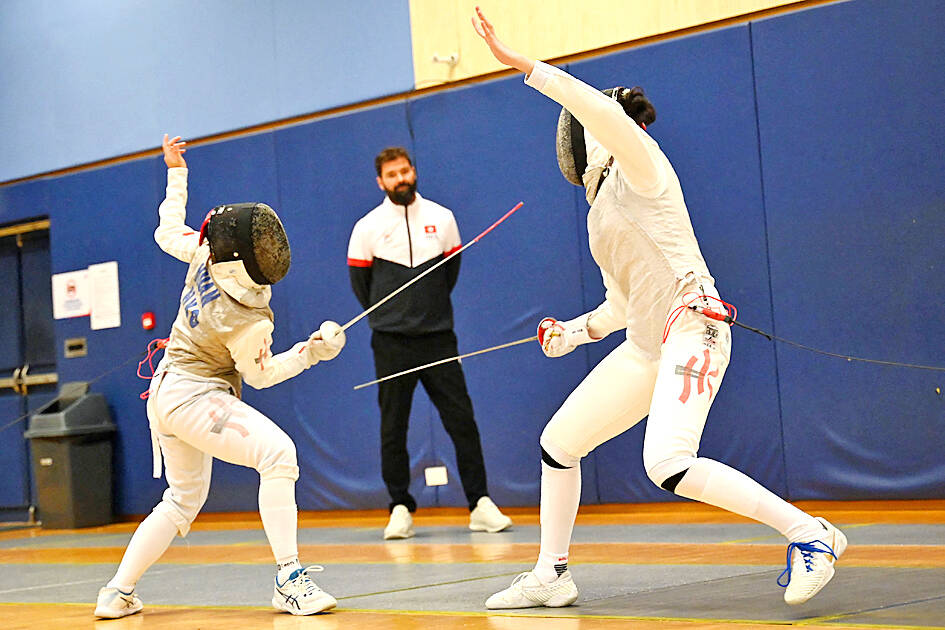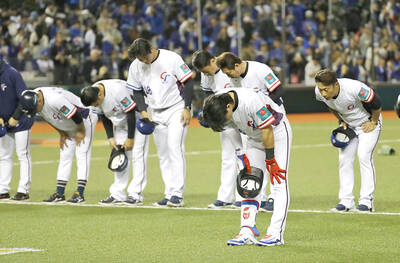Hong Kong is one of the smaller Asian Games teams by population, but when it comes to fencing the territory is a regional heavyweight with ambitious medal hopes.
Edgar Cheung won gold at the Tokyo Games two years ago — Hong Kong’s first Olympic fencing title and first Olympic gold in any sport in 25 years.
It turned Cheung into a celebrity overnight and prompted parents across the territory to rush and sign their children up for fencing classes.

Photo: AFP
Cheung’s historic win in the foil competition was a much-needed dose of good news for a territory mired in social unrest and COVID-19 gloom at the time.
With more funding and public attention as a result, Cheung and his teammates now hope to stamp their mark on the Asian Games in Hangzhou, China, which open on Saturday.
Despite a good record at recent editions, including eight medals in the sport in 2018, Hong Kong has yet to win fencing gold at the Asian Games.

Photo: AFP
“No matter for individual or team events, I hope we can [win gold at last],” 26-year-old Cheung said.
Hong Kong is to have 24 fencers, 12 women and 12 men, at the Games.
Another gold-medal contender is 29-year-old Vivian Kong, who is ranked No. 2 in the world in women’s epee.
There is also Ryan Choi, who along with Cheung was part of the Hong Kong team that won bronze in the men’s team foil at the Fencing World Championships in July.
Cheung said the Hong Kong team have “improved greatly” since the 2018 Asian Games in Jakarta.
The left-hander, who has recovered from a recent wrist injury, said that he wanted to “prove to our competitors they need to beware of us.”
Fencing in the territory stretches back decades, to when Hong Kong was a British colony, with its amateur fencing association founded in 1949.
The territory had occasional success in the early 2000s, but it was the 2010 Asian Games, where Hong Kong fencers won seven medals, that first established them as a regional powerhouse.
Local organizers made efforts to popularize the sport, bringing classes to schools and community hubs over the past two decades — that is where Cheung had his first taste of fencing.
Fencers also benefited from a reform to Hong Kong’s pipeline for discovering and training talent which allowed Cheung to devote himself to the sport full-time when he was 17 with his parents’ blessing.
Cheung’s final bout at the Tokyo Olympics drew hundreds of fans who crowded into a Hong Kong mall to watch the live broadcast, popping champagne corks after he emerged victorious.
Days later, then-Hong Kong chief executive Carrie Lam announced more funding for elite Hong Kong athletes, including an expansion to the fencing hall at the institute where Cheung trains.
Gregory Koenig, who previously coached in his native France and also Taiwan, began working with Hong Kong’s fencers five years ago, and has developed a close relationship with Cheung.
He had a warning for Hong Kong’s star, who has slipped to seventh in the men’s foil world rankings.
“When you’re Olympic champion it’s very hard because everybody has an eye on you and everybody’s fighting hard against you,” Koenig said.
“Okay, do you think you reached the maximum level and you want to stop here? Or are you still motivated for more?” Koenig said he asked Cheung. “He told me: ‘No, I really want to put my name in the history of fencing.’”

Taiwan kept their hopes of advancing to next year’s World Baseball Classic (WBC) alive with a 9-1 victory over South Africa in a qualifier at the Taipei Dome on Saturday, backed by solid pitching. Taiwan last night played against Nicaragua. As of press time, Nicaragua was leading 6-0. Bouncing back from Friday’s struggles on the mound, when Taiwanese pitchers surrendered 15 runs to Spain, Team Taiwan on Saturday kept the visiting team in check, allowing just one run in the bottom of the fourth inning. Starting pitcher Sha Tzu-chen struck out one and allowed no hits, except for a hit-by-pitch over

Team Taiwan are set to face Spain in a win-or-go-home match tonight for the final berth at the 2026 World Baseball Classic (WBC), despite losing to Nicaragua 6-0 in the WBC qualifier at the Taipei Dome on Sunday. The home team’s loss on Sunday means Nicaragua finish first in the qualifier round in Taipei with a perfect 3-0 record and advances to next year’s finals. After crushing South Africa 9-1 earlier on Sunday, Spain took second place in the four-team qualifier with a 2-1 record. With a 1-2 record, Taiwan finished third while South Africa placed at the bottom with

Taiwan kept its hopes of advancing to the 2026 World Baseball Classic (WBC) alive with a 9-1 victory over South Africa in a qualifier at the Taipei Dome last night, backed by solid pitching. Bouncing back from Friday’s struggles on the mound, when Taiwanese pitchers surrendered 15 runs to Spain, Team Taiwan kept the visiting team in check, allowing just one run in the bottom of the fourth inning. The win was crucial for Taiwan, as a loss would have eliminated the team from contention for the next WBC. Starting pitcher Sha Tzu-chen (沙子宸) struck out one and allowed no hits, except for

LONG TIME COMING: With the addition of Marcus Smart, the Washington Wizards finally held a team to under 100 points, the last team this season to do so The Detroit Pistons on Monday won their seventh straight game in the NBA with in-form Cade Cunningham making 32 points and grabbing nine rebounds in a 106-97 win over the Los Angeles Clippers. The Pistons, who are in the playoff position, moved to 32-26, their best record at this stage of a season for 17 years. It was an all-round effort from Detroit with Tobias Harris adding 20 points and Jalen Duren making 19 rebounds along with his 12 points. It was a tight contest until Detroit pulled away late in the third quarter to tie their longest winning streak since the 2014-2015